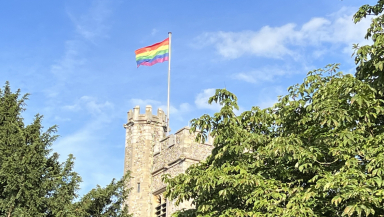
At first sight, the validating of gay blessings by the Church of England is presented in most places as a triumph of common sense and justice. But they may instead represent a climax in a spiritual and ecclesial conflict that threatens to destroy and pervert our culture.
There was a period in my life when I celebrated and worked for LGBTQI+ (etc) too - for about 10 years in fact. I worked at the time at a radical university and so many of my students, of whom I was very fond, were gay.
Anything that helped legitimise their sense of well-being, made more complex by being homosexual, pleased and helped them; and if it pleased and helped them, it pleased me. And moving into the realm of faith, did God not love them more than I did, and also care for the marginalised and excluded more than most? And if so, He would also be pleased. QED.
But of course, there is more than one false premise here, and so I changed my mind.
The first false premise is that therapeutic well-being is the same as the well-being of the soul. It isn't. And that presents the Church of England with its first serious problem. It has forgotten what holiness and salvation are and has replaced them with acceptance and inclusivity.
Sex works very well as an instrument of acceptance and inclusivity, but can be very problematic when practised in the wrong circumstances with the wrong people for salvation and the soul.
And that is the first paradigm shift – the redefining of holiness; or better, the replacing holiness with an (unreliable) concept of wholeness. And this perhaps more than any other theological issue divides the progressives from the conservatives in the Church of England (and elsewhere).
But if that is true, this inability to agree on what must constitute a core currency, language or value - the centrality of holiness - is fatal to the unity and self-understanding of a church. God as a genial non-binary, ever-affirming therapist is a very different god from the one encountered by Moses in the wilderness, Elijah at Mount Horeb, Isaiah in the temple and above all in Jesus.
Replacing this core insight into the nature of God constitutes a new and different religion. Effectively, perhaps partly under the influence of Carl Jung and the culture he represented, the primacy of the comfort and potentiality of the Self has become (one of) the new god(s) amongst many.
And this preferencing of the needs of the Self has been placed with the romantic and erotic preoccupation that defines so much of our narcissistic culture. The highest value seems to have been attached to falling in love and then sleeping with a partner. Sex has become recreational and therapeutic.
It doesn't take more than a moment's reflection to realise that pursuing the interests and appetites or needs of the Self and its potentiality, is the opposite of "pick up your cross, deny yourself and follow me." You might have thought that even a progressive theologian in the C of E would have noticed this and drawn attention to it. Plenty of traditional and biblical Anglicans have of course, and that is the fault line of the division in Synod.
But what this latest vote demonstrates is that the 'Moral Therapeutic deists', or the 'woke, eroticised relativists' are practising a different religion.
The historic creeds don't offer a map to allow us to differentiate between these two religions. They were about different ideological stresses, which is how the progressive 'self-worshippers' have managed to get in under the radar. They have no difficulty parroting the historic creeds, which they either do not understand or don't care about. What they do care about is sex, romance and self-expression; and they are determined to hijack Christianity and use it to offer a form of spiritual endorsement for their solipsistic instincts.
This will not stop here, however. Now this battle has been won, it will move on to gay marriage within a fairly short period. The next development will turn out to be the question of polygamy or polyamory – the adding of initially a third person - creating a throuple in addition to the couple.
"Love is love; you can't discriminate against our needs/desires..." etc. The same arguments that the General Synod has so easily swallowed will be used again here. But the road away from Christian marriage of a man and a woman for the purpose of having children will splinter into ever more perverse variations.
Life will become particularly painful for conservative biblical Anglicans. Tragically, the Anglican experiment appears to be over in this country and this historic vote marks a climactic watershed. If your authority is only the Bible, it has become painfully clear that with a bit of inventive word-play, a text can be interpreted in any way the imagination cares to direct it.
What can faithful Anglicans do?
Some will join independent, faithful, counter-cultural Protestant groups. Some will split into a myriad of conservative Anglican ecclesial groups, as happened in America, because no one will be able to agree about what core authentic Anglicanism is. (Even in America ACNA has had to sidestep the issue of women priests, because it has no mechanism of appealing to an authority structure that everyone recognises, a magisterium.)
Some will switch to Catholicism, where the last battle against secularism has moved to and is being fought. The divisions in Christianity that matter are no longer to do with conflicts that troubled our ancestors in the sixteenth century. Theological and spiritual battle lines have all been redrawn. Each of us has to pray and ask God where He wants us to fight for the faith and witness for the Gospel in what, whether they are or not, certainly feel like the 'Last Days'.
Gavin Ashenden is Associate Editor of the The Catholic Herald and a former chaplain to Queen Elizabeth II.













